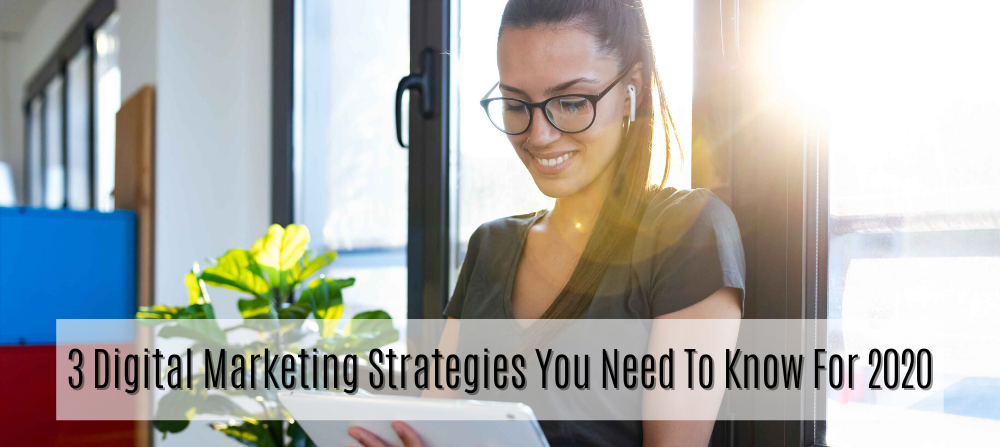As we approach the end of the year faster, it’s a great time to look ahead to where we’re going and the marketing trends that we’re likely to see more of in 2020. I’ve already touched on how we can expect marketing to evolve at a strategic level, and in this article, I’ll look at some of the specific trends that need to be looked for in more detail.
Technology continues to advance at a rapid pace, so some of these trends are targeted at technology, of course. But there’s also a pushback against the increased digitization and automation of brand-consumer interactions, and a desire to make marketing more human again.
Although innovations such as AI and data-driven marketing will definitely be major trends by 2020, people will be the overarching focus, not technology.
1. Virtual and Augmented Reality
Mobile cameras are leveraged by smart businesses to enhance their customer experience. Through bringing your goods to life, you can boost brand experience through VR and AR, and help with pre-purchase decisions. Through allowing consumers to interact more profoundly with engaging interactions, they are better prepared to find what they are searching for and be happy to do so.
Consider Amazon, which set up Oculus Rift VR booths during Prime Day, enabling shoppers to encounter as they would in physical reality a wide variety of items from nerf guns to refrigerators.
Through encouraging potential customers to actually imagine owning goods and simulating this future fact, VR addresses desires and pain points preemptively and significantly improves the consumer experience.
Augmented reality can offer greater accessibility and scope by the integration of mobile devices when it’s not possible to get users to a specific physical location. StubHub masterfully accomplished that, adding an AR app that allowed fans to better understand the city and stadium ahead of this year’s Super Bowl. Potential ticket buyers could click to see a stadium 3D map, parking, transit lines, and more, making it easier to envision themselves at the event.
Through strategically introducing virtual or augmented reality, you have a unique opportunity to provide customers with the breadth of pre-purchase knowledge they need, while reducing the effort they need to make to get it.
2. Customer Experience
2020 will be the Customer’s Year. We ‘re seeing a major change in attitudes on what marketing really is. This is no longer about trying to persuade people to buy from your business or to collaborate for it. Instead, the focus has changed to delivering great customer interactions to keep customers coming back for more. In a way, when you focus on creating a positive corporate culture and providing quality service, marketing takes almost care of itself.
Growing online content has brought more power to consumers. When it comes to product learning they are no longer a passive group. We don’t wait for you to tell you just how amazing your products are.
They go out, instead, and do their own work.
So, people got to give them more than information.
Exactly what makes a perfect CX? In their customer experience, quality, comfort, knowledgeable and friendly service, and convenient payment options are what customers enjoy the most. Yet factors that are more commonly seen as the realm of marketing are often cited: state-of-the-art technology, personalization, simple mobile interface, brand identity, and design all add up to the overall customer experience.
In other words, you will take CX into account in every aspect of your marketing strategy. That’s how you can offer a perfect experience to retain your clients and attract new ones.
In reality, as you go through this list, you can see that every pattern is really just one factor in the overall experience of the customers.
3. AI-Based Automation
Will 2020 be the year of the rise of the robots! Maybe (but definitely not in dystopian science fiction film-style Terminator!)
In the past few years, we’ve also seen huge developments in AI and a massive rise in the number of companies using AI-powered technology and automation to support their marketing efforts.
AI is one of the big technologies behind digital assistants and voice search. It’s also made possible chatbots, which are now appearing on more websites than ever before.
AI technology and automation help to get some of the hard work out of marketing, so that brands can concentrate on strategy and create a fantastic customer experience.
Note, the human aspect of marketing is still important (maybe more important than ever before), so the goal is to use this technology to improve the marketing efforts and not to replace the actual people behind them.
Big data, which is driven by AI and predictive analytics, also lets companies learn more about their customers and clients. It allows consumer experiences and marketing campaigns to be hyper-personalized at a scale.
Get Ready for 2020
Now is the time to begin preparing your marketing campaign for 2020, if you haven’t already. Make sure you start the New Year with a straightforward outline of your goals and how you can accomplish them.
I can’t really call it a phenomenon but in 2020, content marketing will continue to dominate the digital marketing landscape. Most of those trends somehow depend on content. You would need a solid base of quality content across all your marketing channels to be effective in all these.
If you’re prepared to get more traffic to your site with regularly published quality content, check out our Web Builder Service. Set up a fast guide and I’ll give you a free PDF version of my books. Start your business today and generate more traffic and leads.
